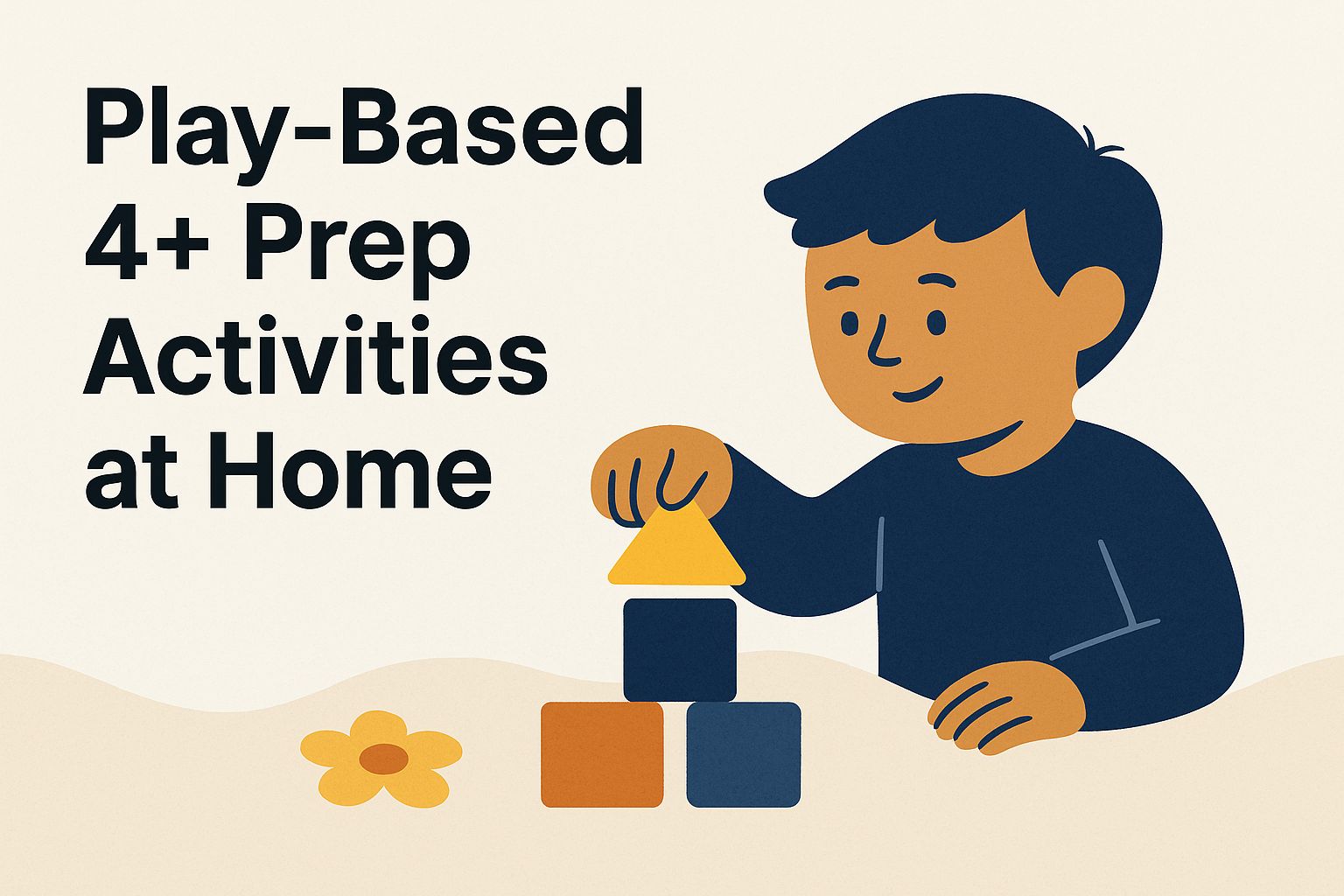
Play-Based 4+ Prep Activities at Home
Imagine transforming your living room into a vibrant adventure zone where learning happens effortlessly through play! When parents introduce play-based 4+ prep activities at home, it not only keeps children engaged but also helps them build the skills needed for 4+ exam success.
Play-based learning is more than just fun; it’s essential for kids aged 4 and up, helping them develop critical skills while keeping their curiosity alive. The 4+ exam, used by many schools as part of their admissions process, often looks at early literacy, numeracy, problem-solving, and social interaction—all of which can be nurtured through playful activities at home.
In this guide, we’ll dive into setting up an engaging play environment, explore various playful activities, and discover how you can seamlessly integrate learning with fun.
Ready to turn playtime into a remarkable learning journey? Let’s jump in!
Definition and Importance
Play-based learning effectively combines structured play with educational objectives, enabling children to learn naturally while enjoying themselves. This approach is essential for nurturing critical skills during early childhood development.
For example, activities such as role-playing significantly enhance social skills, as children engage in negotiation and communication with their peers. Similarly, building blocks encourage critical thinking, allowing children to experiment with concepts of balance and structure.
Parents and educators can further enrich play-based learning by offering a variety of materials—such as art supplies and jigsaws—and promoting collaborative games. Resources like the Play-Based Learning Toolkit provide valuable activities designed to stimulate creativity and problem-solving, transforming the learning experience into a joyful exploration.
Benefits for Children Aged 4+
Research indicates that engaging in play-based learning can enhance cognitive skills by as much as 30%, making it an essential aspect of education for children aged four and older.
To implement play-based learning effectively, educators can integrate activities such as building blocks, which help foster spatial awareness and problem-solving abilities.
Role-playing games serve to improve social skills and emotional comprehension, while interactive storytelling encourages literacy and creativity.
Additionally, tools like LEGO Education kits and Montessori materials can support these activities, creating structured yet flexible learning environments.
Utilising outdoor play not only promotes physical development but also encourages collaboration among peers. By incorporating these methodologies into daily routines, educators can significantly enhance children’s developmental outcomes.
Setting Up a Playful Environment
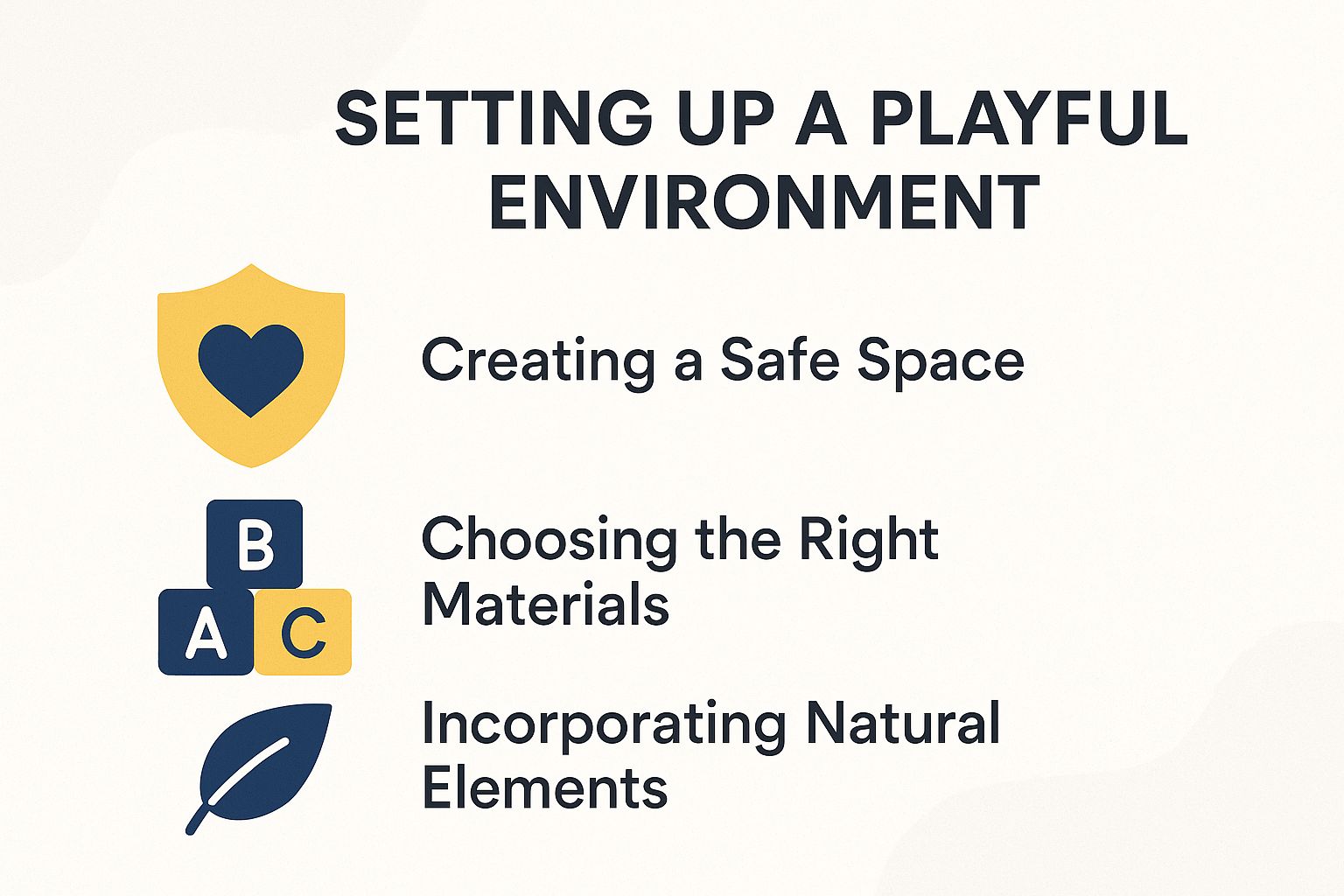
Establishing an inviting and stimulating environment is essential for fostering effective play-based learning experiences. An important aspect of this environment is balancing activities and managing technology use, particularly for children. Managing screen time wisely ensures that digital tools enhance learning rather than detract from it.
Creating a Safe Space
Creating a safe learning space is essential. It is important to ensure that play areas are free from hazards, featuring soft surfaces and child-proofed furniture.
Begin by incorporating foam mats or carpet tiles to establish soft landing zones that can absorb impacts during play. Additionally, securing heavy furniture to walls with brackets can prevent tipping, providing an extra layer of safety. It may also be wise to use safety gates to limit access to potentially hazardous areas.
Regular inspections of play equipment for signs of wear and tear are crucial, ensuring that all screws and parts remain tight and intact. Establishing clear rules for play activities helps set consistent expectations. This proactive approach not only enhances safety but also promotes a positive learning environment.
Choosing the Right Materials
Selecting the right materials can greatly enhance the quality and variety of play experiences for children. It is beneficial to include a mix of blocks, sensory bins, art supplies, and manipulatives in their play environment.
For example, wooden building blocks not only encourage creativity but also help develop fine motor skills as children engage in stacking and balancing activities. Sensory bins filled with rice or beans provide opportunities for tactile exploration, which is essential for sensory development. Art supplies, such as non-toxic paints, promote artistic expression and ignite imagination in young minds. Additionally, incorporating LEGO sets can enhance spatial awareness and encourage problem-solving skills.
By diversifying play materials, one supports a holistic approach to development, nurturing various skills in a fun and engaging manner.
Incorporating Natural Elements
Integrating natural elements into play spaces fosters exploration and a deeper connection with the environment, which can significantly enhance cognitive and sensory skills.
There are several engaging activities that can involve natural materials.
- For example, organising a nature scavenger hunt encourages children to search for leaves, rocks, and flowers, which in turn develops their observation skills.
- Additionally, creating a mud kitchen promotes imaginative play whilst providing opportunities to learn about different textures and sensory experiences.
- Using logs or stones to construct obstacle courses can also encourage physical activity and improve coordination.
Moreover, tools like nature collection boxes allow children to gather and examine their discoveries, sparking creativity and nurturing their curiosity about the world around them.
Types of Play-Based Activities
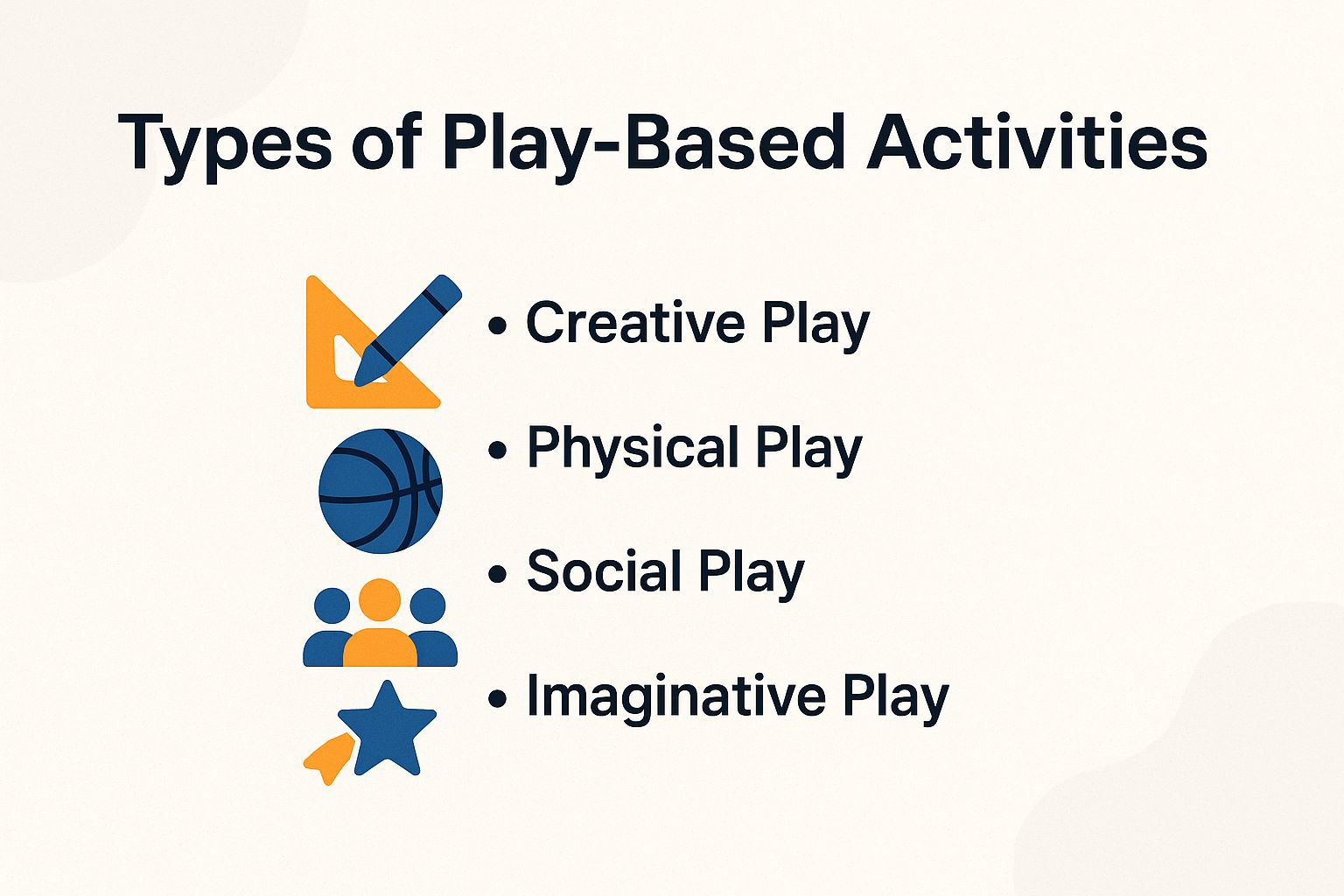
Diverse play-based activities are designed to address various learning styles and developmental needs, thereby enriching the educational experiences of children. For parents looking to expand these activities, exploring additional creative activities can help when kids express boredom, ensuring ongoing engagement and learning opportunities.
Creative Play
Creative play plays a crucial role in fostering artistic expression and problem-solving abilities, enabling children to explore their ideas through various mediums. Engaging in activities such as painting, clay modelling, or storytelling can significantly enhance both cognitive and emotional development in young ones.
For example, painting not only helps children recognise colours but also improves their fine motor skills. Meanwhile, clay modelling offers valuable tactile experiences and promotes spatial awareness. Storytelling, on the other hand, nurtures imagination and language skills, assisting children in articulating their thoughts effectively. These activities also promote collaboration, as children often work together to create, which in turn enhances their social skills.
By setting aside regular time for creative play, parents can nurture their child’s creativity and provide an enriching environment that celebrates exploration and self-expression.
Physical Play
Physical play is essential for the development of gross motor skills, coordination, and overall physical health in young children. By incorporating a variety of activities, parents and carers can significantly enhance their child’s physical development.
For example, creating obstacle courses with household items can provide children with opportunities to climb, jump, and crawl, thereby improving their agility.
Movement games like ‘Simon Says‘ not only foster listening skills but also encourage actions that build strength and balance. Additionally, engaging in outdoor sports, such as football or tag, promotes teamwork and enhances cardiovascular fitness.
It is important to prioritise safety by ensuring that play areas are free of hazards and that children are equipped with age-appropriate gear, such as lightweight shin pads for football. Regular participation in these activities supports holistic development while ensuring that play remains enjoyable.
Social Play
Engaging in social play is instrumental in helping children develop critical communication and teamwork skills that are essential for their future success. Group activities that encourage social interaction play a vital role in enhancing these abilities.
Cooperative games, such as ‘Human Knot,’ require children to collaborate in order to untangle themselves without letting go of each other’s hands. This fosters both problem-solving and teamwork.
Similarly, group storytelling encourages creativity and active listening, as children take turns contributing to a shared narrative.
Additionally, activities like freeze dance can be quite beneficial, providing children with a playful platform to interact and express themselves. These activities not only create an enjoyable atmosphere but also strengthen friendships and cultivate essential social skills.
Imaginative Play
Imaginative play offers children the opportunity to explore various roles and scenarios, which in turn enhances their cognitive and emotional development. Engaging in role-playing activities—such as simulating community jobs or family interactions—can significantly improve their empathy and social understanding.
For example, when children play ‘doctor‘, they begin to appreciate the importance of care and compassion, while taking on the role of ‘shopkeeper‘ teaches them valuable lessons about commerce and teamwork.
To implement these activities at home, consider scenarios that align with your child’s interests, such as embarking on a space adventure or experiencing a typical school day.
Incorporating dressing-up games can further enrich this experience. Simple costumes made from everyday items or craft supplies not only stimulate creativity but also help children immerse themselves in their roles.
These activities serve to foster skill development and simultaneously strengthen family bonds through shared storytelling experiences.
Activity Ideas for Home
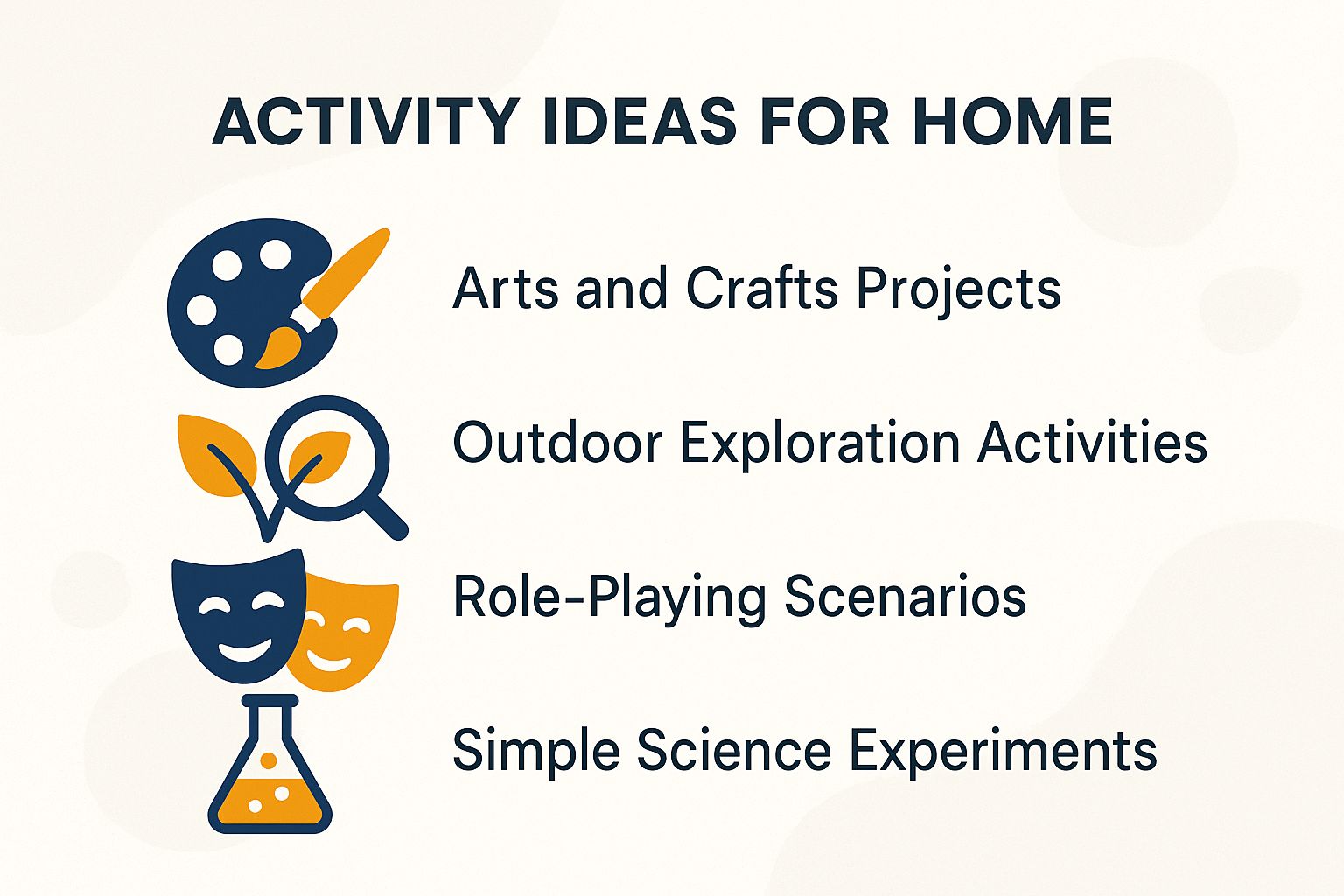
Incorporating play-based activities at home enhances the learning experience and fosters quality bonding time between parents and children. Engaging in these activities not only supports educational development but also strengthens family connections.
However, when children complain about boredom, having a variety of activities readily available can be crucial to maintaining engagement. As mentioned in our guide, 100 Things to Do When Kids Complain They Are Bored, diversifying activities can effectively address boredom while enriching learning.
Arts and Crafts Projects
Arts and crafts serve as excellent avenues for fostering creativity and developing fine motor skills, with projects that can be easily set up at home. Here are five straightforward ideas to get started:
- Paper Plate Fish: For this project, you will need paper plates, paints, and googly eyes. Begin by painting the plates in vibrant colours, then cut them into fish shapes, and finally attach the googly eyes for a delightful sea life creation.
- Rock Painting: Collect smooth, clean rocks and some acrylic paints. Encourage children to design unique patterns or create images of animals, and be sure to use a water sealant to preserve their artistic endeavours.
- Homemade Playdough: Combine flour, salt, water, and food colouring to create colourful playdough. This engaging activity not only provides a creative outlet but also helps develop sensory skills.
- Nature Collage: Gather leaves, flowers, and twigs from your surroundings. Using glue, arrange these natural materials on a piece of cardstock, which promotes exploration and encourages creativity.
- Cardboard Sculptures: Collect cardboard boxes and scissors. Encourage children to construct 3D sculptures by cutting and assembling various pieces, which enhances their spatial awareness.
These activities not only ignite imagination but also offer valuable opportunities for learning through play.
Outdoor Exploration Activities
Outdoor exploration activities serve to connect children with nature, fostering both curiosity and sensory development.
One engaging activity that stands out is a nature scavenger hunt. In this activity, children search for specific items, such as pine cones, unique leaves, or bird feathers. To enhance their experience, it is beneficial to provide them with a simple checklist and a magnifying glass, allowing them to examine their findings closely.
Another excellent option is outdoor art, where children can create nature-inspired paintings using materials like leaves, stones, or twigs as tools. It is important to remind them to respect the environment, ensuring they do not damage plants or disturb wildlife.
Additionally, utilising apps like Seek by iNaturalist can further enrich these outdoor experiences, encouraging children to identify and learn about their natural surroundings.
Role-Playing Scenarios
Role-playing scenarios serve as a wonderful way to ignite children’s imagination while also deepening their understanding of real-world situations. To create engaging role-play experiences at home, consider setting up a ‘supermarket‘ and a ‘doctor’s surgery.‘
For the supermarket, gather some empty food containers and a shopping trolley. This setup allows your child to practise budgeting with play money, while you can introduce discussions about healthy eating habits.
In the doctor’s surgery scenario, utilise a toy medical kit to enable your child to examine dolls or soft toys. This not only fosters empathy but also encourages problem-solving skills.
Regularly rotating themes keeps playtime both fresh and educational, promoting creativity and enhancing social skills.
Simple Science Experiments
Simple science experiments play a significant role in fostering curiosity and critical thinking, making the learning process enjoyable and engaging for young children. Here are three easy experiments to ignite their interest:
- Vinegar and Bicarbonate of Soda Volcano: By combining vinegar and bicarbonate of soda in a container, you can create an exciting effervescent reaction that resembles an erupting volcano. This provides an opportunity for children to observe gas production and discuss the underlying chemical reaction.
- Colour Mixing with Food Colouring: Fill clear cups with water and add different food colourings. As children mix the colours, they can discover primary and secondary colours while gaining insight into colour theory.
- Floating Egg Experiment: Start by placing a raw egg in fresh water and observe it sinking. Next, dissolve salt in another glass of water and place the egg in it again to witness it float. This experiment effectively demonstrates the concepts of density and buoyancy.
These experiments not only capture the attention of young minds but also encourage them to ask questions and explore the world around them further.
Integrating Learning with Play
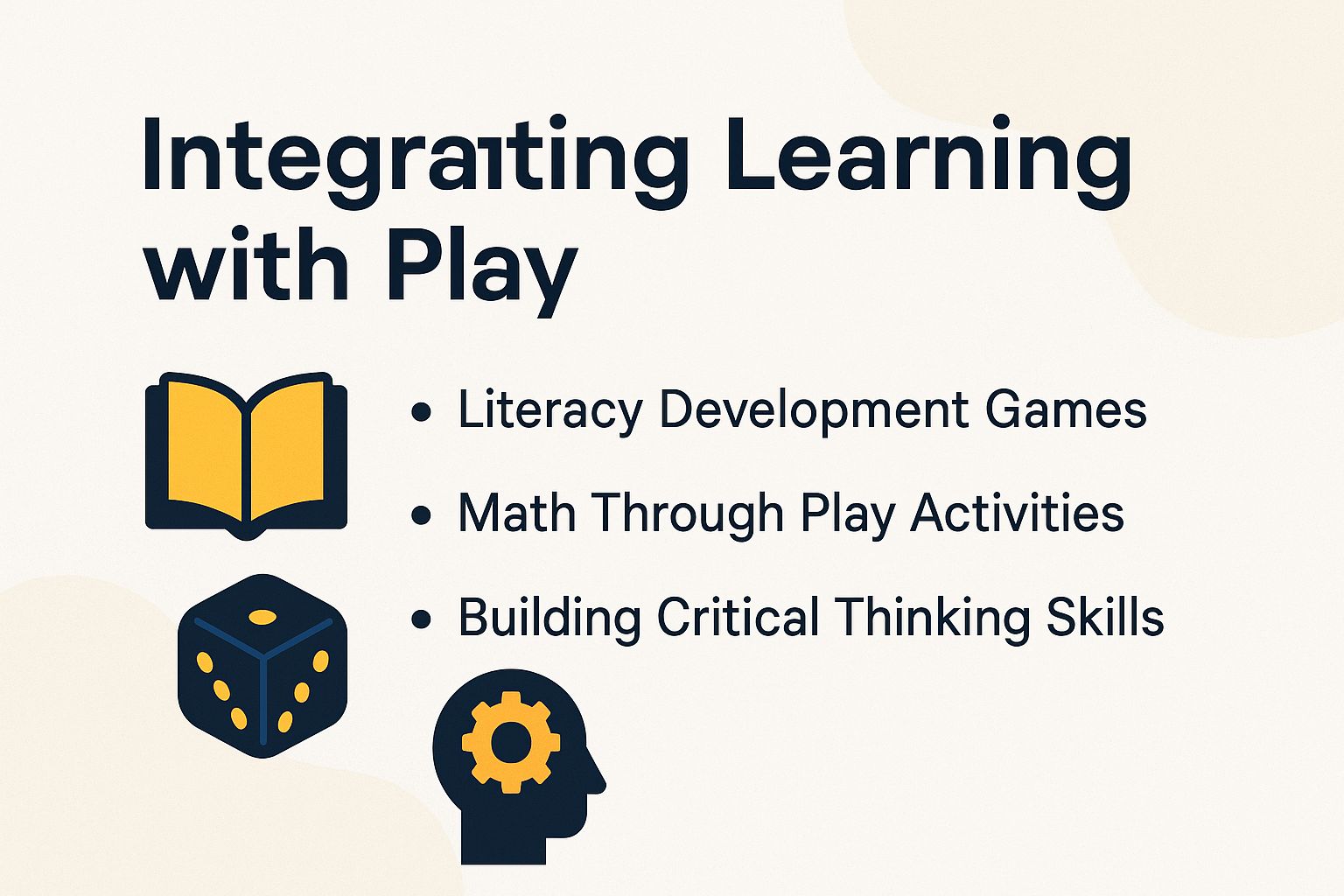
Integrating learning with play allows educational concepts to be absorbed in a natural manner, making them more relatable for children.
This approach fosters an environment where children can engage with the material actively, making the learning experience both enjoyable and effective.
Literacy Development Games
Games that promote literacy development can transform the process of learning to read and write into an enjoyable experience for children.
- One engaging activity is the “Word Scavenger Hunt,” where children search for objects around the house or garden that begin with specific letters. This not only enhances their letter recognition but also makes learning interactive and enjoyable.
- Another enjoyable option is the “Story Cubes,” where children roll dice featuring various images and create stories based on the pictures they see. This activity encourages creativity and helps develop their narrative skills.
- Lastly, the “Letter Treasure Hunt” involves hiding letters around a room and having children find and arrange them to form words. Activities like these are particularly valuable for children preparing for a 4+ assessment, as they strengthen early literacy, listening, and communication skills—areas that are often observed during the assessment process.
These activities not only foster literacy skills but also ensure that children have a fantastic time while learning.
Math Through Play Activities
Engaging children in mathematics through play activities significantly enhances their numerical understanding and problem-solving skills. Three enjoyable maths games that can easily be set up at home are ‘Number Hopscotch‘, ‘Maths Bingo‘, and ‘Shape Scavenger Hunt‘.
- To play ‘Number Hopscotch’, you simply need some chalk to draw a hopscotch grid with numbers. This game encourages children to jump from number to number, allowing them to practise counting while planning their landings.
- ‘Maths Bingo’ is another excellent option that can be created using paper grids filled with simple maths problems. Children can solve these problems to mark their cards, making it an engaging way to reinforce their skills.
- In a ‘Shape Scavenger Hunt’, you can hide various shapes around the house, prompting children to find and classify them.
These games not only make learning enjoyable but also foster an interactive environment that promotes mathematical development.
Building Critical Thinking Skills
Activities designed to challenge children’s thinking play a crucial role in fostering critical reasoning and problem-solving abilities. Engaging children in games and puzzles, such as Sudoku, logic grid puzzles, and chess, can significantly enhance their cognitive skills.
For instance, Sudoku promotes pattern recognition and numerical logic, making it suitable for children aged eight and above. Logic grid puzzles, often found in puzzle books, encourage deductive reasoning, allowing children to identify relationships and collaboratively solve problems.
Meanwhile, chess nurtures strategic thinking and foresight, making it an excellent choice for developing patience and planning skills.
Incorporating these activities into regular playtime not only provides enjoyable experiences but also ensures that children are learning in a fun and engaging way.
Encouraging Independence and Choice
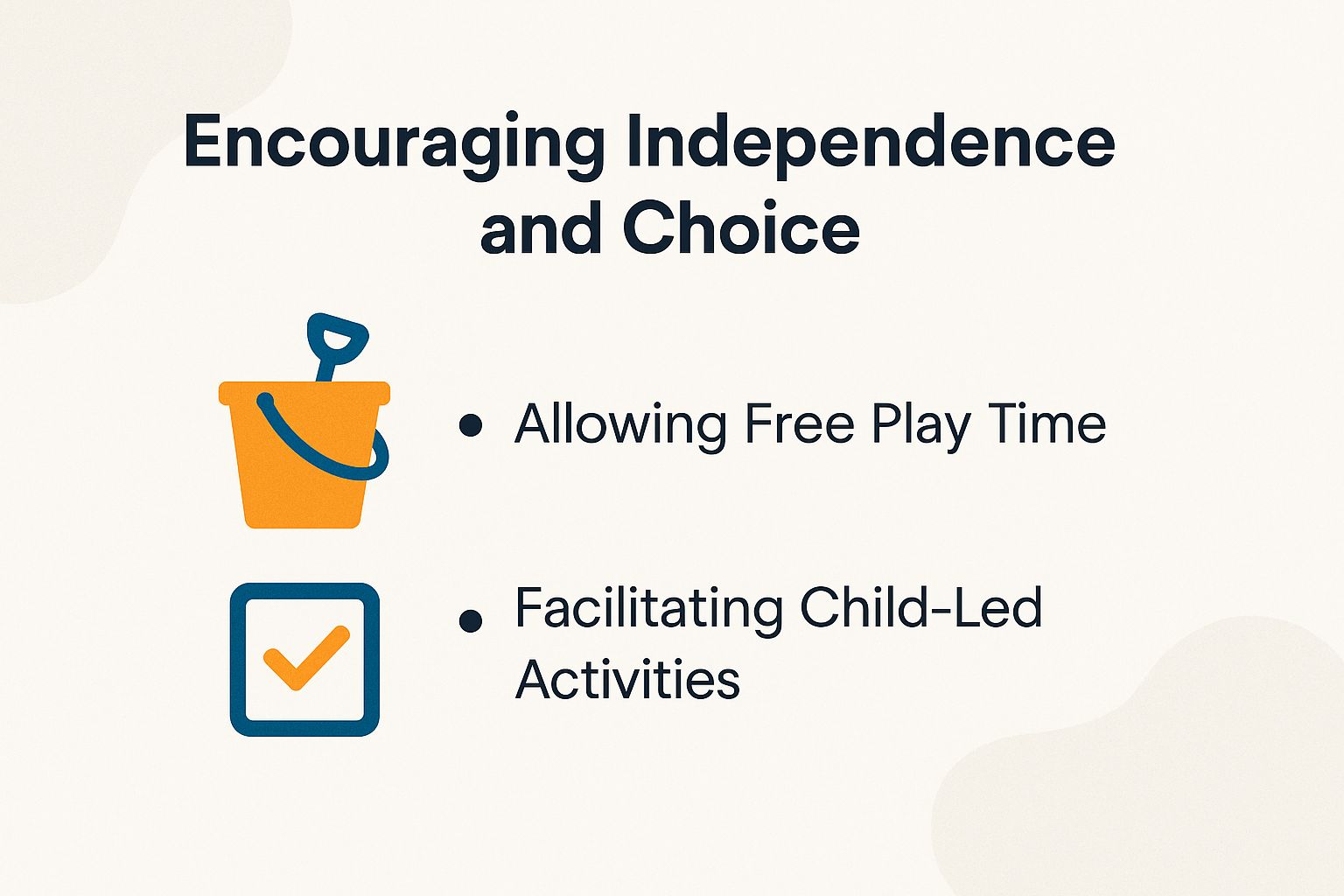
Promoting independence plays a crucial role in enabling children and fostering self-directed learning, both of which are essential elements of healthy development. Learn more about how our educational philosophy supports these principles in practice by visiting our About Us page.
Allowing Free Play Time
Free playtime is essential for fostering autonomy and self-confidence in children. To effectively integrate unstructured play into a child’s daily routine, it is beneficial to designate specific time slots for this activity. For example, setting up a ‘play hour’ immediately after school can provide children with the opportunity to relax and explore their interests.
To facilitate this playtime, consider offering a few resources such as:
- Building blocks
- Art supplies
- Nature exploration kits
It is advisable to limit structured activities to just two days a week, ensuring that children have plenty of time for free play. Additionally, it is important to lead by example; engaging in unstructured activities yourself can demonstrate the joy of creativity and independence to your children.
Facilitating Child-Led Activities
Facilitating child-led activities enables children to take control of their learning experiences, fostering both creativity and engagement. To encourage this, it is beneficial to begin by observing your child’s interests and passions.
For instance, if they have a fascination with nature, consider taking them on nature walks where they can collect leaves or stones.
It is also important to provide a diverse array of materials, such as art supplies, building blocks, and books, which allows them to explore various mediums. Creating a dedicated space for these activities gives children the freedom to lead the way, choosing what they wish to create or learn about each day.
This approach not only nurtures their independence but also reinforces their confidence in making decisions.
Frequently Asked Questions
What are play-based 4+ prep activities for home?
Play-based 4+ prep activities at home are fun and interactive educational activities designed for children ages 4 and up. They involve learning through play in a home environment, which helps children develop important skills and knowledge while having fun.
What are the benefits of play-based 4+ prep activities at home?
Play-based 4+ prep activities at home have numerous benefits for children, including improving their cognitive, social, emotional, and physical development. These activities also help children learn important skills such as problem-solving, creativity, and critical thinking.
Can I use everyday household items for play-based 4+ prep activities at home?
Yes, you can use everyday household items for play-based 4+ prep activities at home. These activities often involve simple materials such as blocks, toys, and art supplies, making them easy and affordable to set up. You can also get creative and use items like pots and pans, cardboard boxes, and other household items for different types of play-based activities.
Are there specific play-based 4+ prep activities for different subjects at home?
Yes, there are play-based 4+ prep activities for various subjects that you can do at home. These include activities for literacy, math, science, and art. You can find many resources online or create your own activities that focus on specific subjects to help your child learn and have fun at the same time.
How do I incorporate play-based 4+ prep activities into my child’s daily routine?
You can incorporate play-based 4+ prep activities into your child’s daily routine by setting aside a specific time each day for these activities. You can also include them in your child’s playtime or integrate them into daily tasks such as cooking or cleaning. This will help make learning more enjoyable and a regular part of your child’s day.
What should I do if my child doesn’t seem interested in play-based 4+ prep activities at home?
If your child is not interested in play-based 4+ prep activities at home, try to find activities that align with their interests and preferences. You can also make the activities more exciting by involving your child’s favourite toys or characters. If your child still shows little interest, take a break and try again later. It’s essential to make sure that the activities are enjoyable and not forced on your child.



